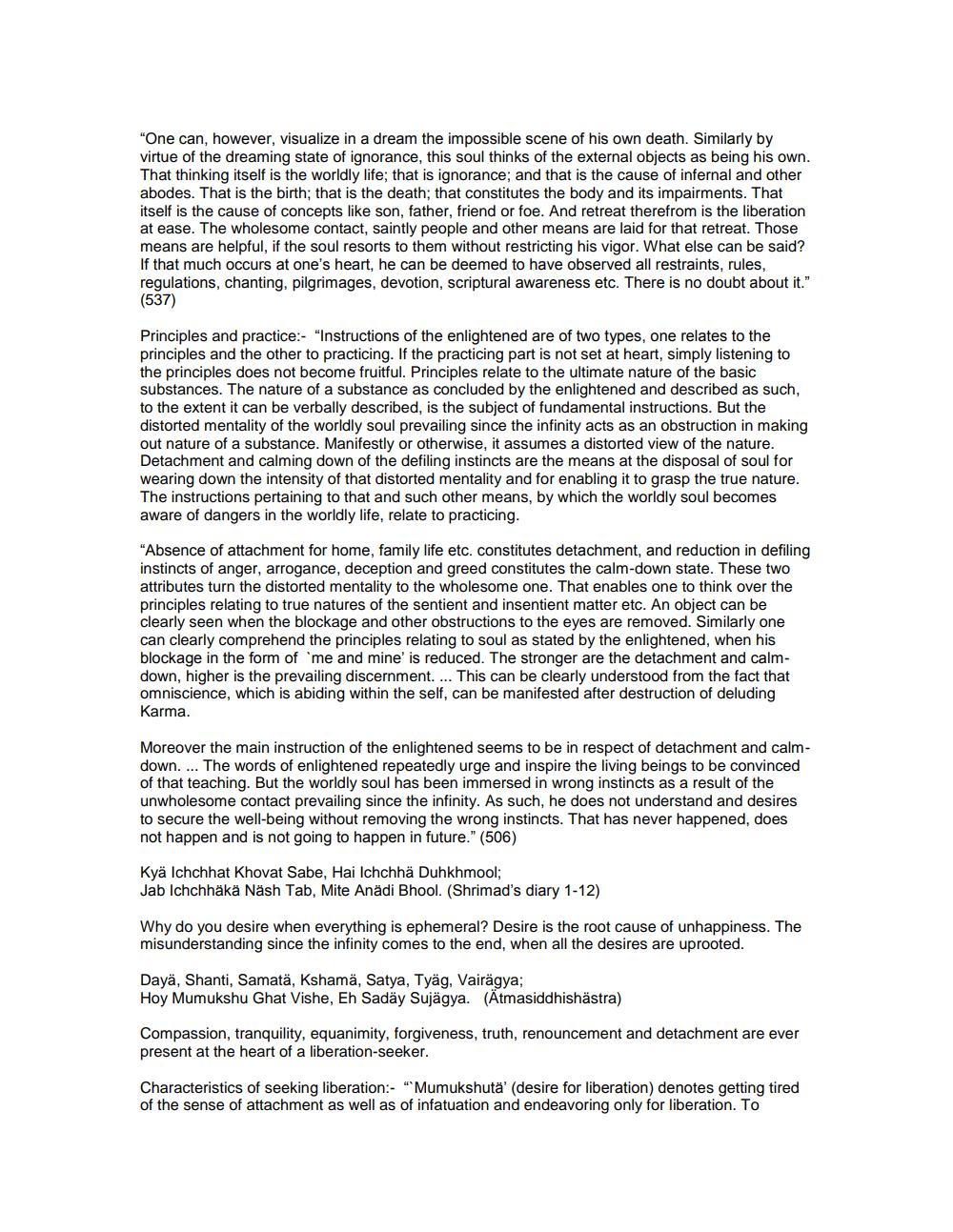________________
"One can, however, visualize in a dream the impossible scene of his own death. Similarly by virtue of the dreaming state of ignorance, this soul thinks of the external objects as being his own. That thinking itself is the worldly life; that is ignorance; and that is the cause of infernal and other abodes. That is the birth; that is the death; that constitutes the body and its impairments. That itself is the cause of concepts like son, father, friend or foe. And retreat therefrom is the liberation at ease. The wholesome contact, saintly people and other means are laid for that retreat. Those means are helpful, if the soul resorts to them without restricting his vigor. What else can be said? If that much occurs at one's heart, he can be deemed to have observed all restraints, rules, regulations, chanting, pilgrimages, devotion, scriptural awareness etc. There is no doubt about it." (537)
Principles and practice:- "Instructions of the enlightened are of two types, one relates to the principles and the other to practicing. If the practicing part is not set at heart, simply listening to the principles does not become fruitful. Principles relate to the ultimate nature of the basic substances. The nature of a substance as concluded by the enlightened and described as such, to the extent it can be verbally described, is the subject of fundamental instructions. But the distorted mentality of the worldly soul prevailing since the infinity acts as an obstruction in making out nature of a substance. Manifestly or otherwise, it assumes a distorted view of the nature. Detachment and calming down of the defiling instincts are the means at the disposal of soul for wearing down the intensity of that distorted mentality and for enabling it to grasp the true nature. The instructions pertaining to that and such other means, by which the worldly soul becomes aware of dangers in the worldly life, relate to practicing.
"Absence of attachment for home, family life etc. constitutes detachment, and reduction in defiling instincts of anger, arrogance, deception and greed constitutes the calm-down state. These two attributes turn the distorted mentality to the wholesome one. That enables one to think over the principles relating to true natures of the sentient and insentient matter etc. An object can be clearly seen when the blockage and other obstructions to the eyes are removed. Similarly one can clearly comprehend the principles relating to soul as stated by the enlightened, when his blockage in the form of me and mine' is reduced. The stronger are the detachment and calmdown, higher is the prevailing discernment. ... This can be clearly understood from the fact that omniscience, which is abiding within the self, can be manifested after destruction of deluding Karma.
Moreover the main instruction of the enlightened seems to be in respect of detachment and calmdown. ... The words of enlightened repeatedly urge and inspire the living beings to be convinced of that teaching. But the worldly soul has been immersed in wrong instincts as a result of the unwholesome contact prevailing since the infinity. As such, he does not understand and desires to secure the well-being without removing the wrong instincts. That has never happened, does not happen and is not going to happen in future." (506)
Kyä Ichchhat Khovat Sabe, Hai Ichchhä Duhkhmool; Jab Ichchhäkä Näsh Tab, Mite Anädi Bhool. (Shrimad's diary 1-12)
Why do you desire when everything is ephemeral? Desire is the root cause of unhappiness. The misunderstanding since the infinity comes to the end, when all the desires are uprooted.
Dayä, Shanti, Samata, Kshamä, Satya, Tyag, Vairagya; Hoy Mumukshu Ghat Vishe, Eh Saday Sujagya. (Ätmasiddhishästra)
Compassion, tranquility, equanimity, forgiveness, truth, renouncement and detachment are ever present at the heart of a liberation-seeker.
Characteristics of seeking liberation:- "Mumukshutä' (desire for liberation) denotes getting tired of the sense of attachment as well as of infatuation and endeavoring only for liberation. To




